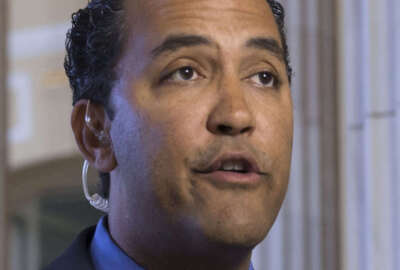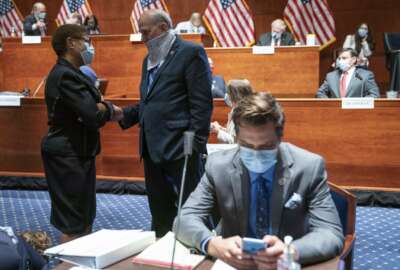Current, former Hill staffers say centralized authority needed to modernize Congress
The House Select Committee on Modernization seeks ways to gain traction on pre-existing recommendations to make Congress more technologically savvy.
The upside to Congress’ decentralized nature is that innovation can come from anywhere. The downside is that coordinating those innovations is hard.
Current and former Hill staffers say technology can and has solved many common problems for members of Congress, but they want to see members tap into more commercial-friendly platforms and give centralized authority to bodies like the Bulk Data Task Force, or the House Digital Service.
Stephen Dwyer, senior adviser to House Majority Leader Steny Hoyer (D-Md.), pointed to solutions such as the Dome Watch and Dome Directory mobile apps, created by the office to help members of Congress, their staff and the public better track movements on the House floor. The 13-year-old private intranet DemCom for House Democratic staff was also redesigned last year with expanded access for Senate staff, mobile functionality and a bigger database of information.
But custom-built systems for “uniquely Congressional purposes,” as Dwyer said, are not all that’s recommended. He told the House Select Committee on Modernization last week, the programs are representative of what is possible when the legislative body coordinates its technology efforts, but that requires in-house digital staff for each office. He recommended hiring digital aides with programming and development skills for every member, in addition to more traditional political science and communications staffers.
“There’s just so much more that they need to do, even versus five, 10 years ago when I was in a congressional office,” Dwyer said. “A lot of that is in digital communications. Every office needs to not just take a bunch of pictures and post them on Twitter and Facebook but they have to do more technical Facebook Lives, they’ve got to take their boss live, there’s a lot of technical tasks that didn’t exist many years ago.”
But Dwyer said Congress needs to recognize the demand for these workers and compensate them appropriately. The House is raising its staff salary floor to $45,000, after essentially a decade-long pay freeze and record inflation made it difficult to attract and retain employees.
One of the Modernization committee’s recommendations last Congress was to create a common committee calendar portal to reduce scheduling conflicts. Vice Chairman William Timmons (R-S.C.) asked witnesses for suggestions to get the ball rolling on what he said could have a big impact on members and staff. Reynold Schweickhardt, Lincoln Network senior adviser, said an issue is that between the House clerk, the chief information officer and the committees themselves there is no clear button to push for technology needs. As such, another recommendation was to clearly focus the responsibility for legislative product.
“I think the other challenge that I alluded to is there’s no gatekeeper for scheduling projects. The CIO, they may be working on five to 10 projects, so they tell you they’re working on your project and they are, but they’re sort of shuffling things back and forth,” said Schweickhardt, who served at the Committee on House Administration for 13 years and the Government Publishing Office for eight years Versus a program-management kind of functionality that says, ‘What are the three things we want to accomplish in the next couple of months? Let’s knock ‘em out. Let’s figure out what the next set of important things are.’”
Dwyer said the foundation is laid. For several years, House rules have required all committees to post hearings and testimony in a central place, putting the body ahead of the Senate, but amplifying that with a more consumer-friendly version would help, he said.
Melissa Dargan, co-founder of AppMy LLC and a former Hill staffer, seconded the use of funds for a centralized scheduling platform. It’s a problem she tried to tackle when she launched the TourTrackr app to better manage constituent tour requests.
“From constituent tour requests to flown flag purchases, these important responsibilities were tracked using printouts, binders and excel spreadsheets. It was a fragmented, inefficient process. At the time, there were no digital alternatives that House offices were approved to use. So while these tasks seemed easy, they were tedious, repetitive and time consuming,” she said, adding that technological innovation does not need to come at the expense of security.
“I respect and understand that the House has high standards for new tech approval. Protecting security and personal identifiable information are critical to ensure the integrity of the institution. That said, upholding those priorities and creating a welcoming environment for new tech products can be done simultaneously,” Dargan said.
Copyright © 2024 Federal News Network. All rights reserved. This website is not intended for users located within the European Economic Area.
Amelia Brust is a digital editor at Federal News Network.
Follow @abrustWFED






